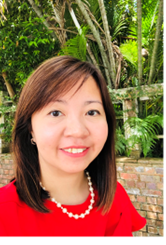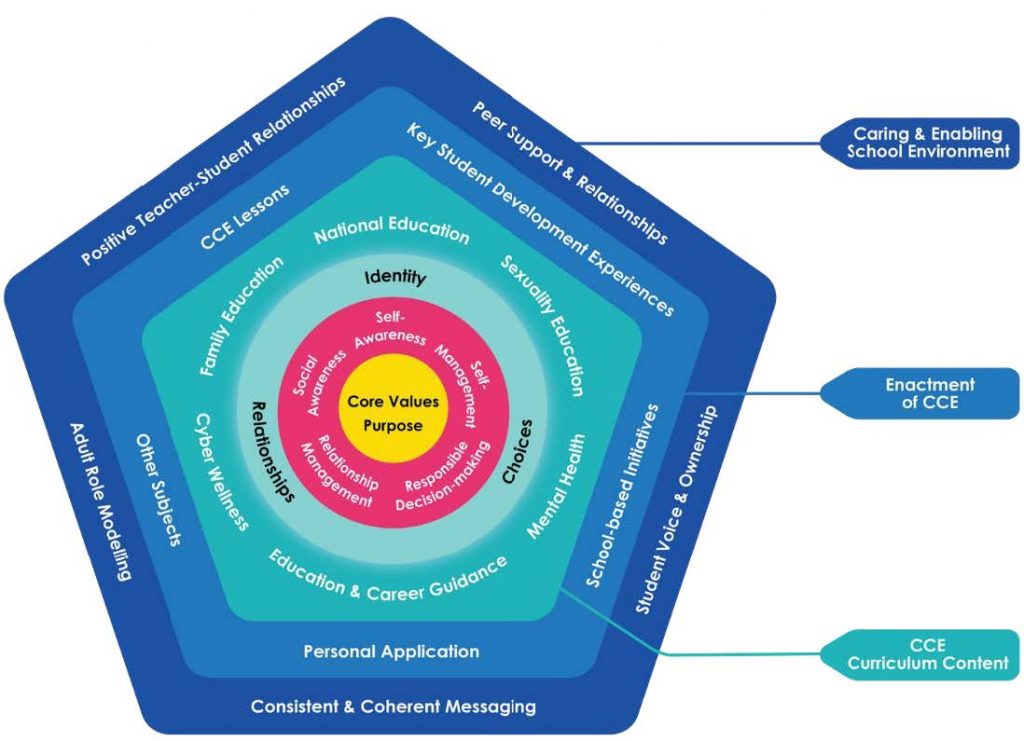Young Children’s Voices in Mathematical Problem Solving
Contributed by Dr Ho Siew Yin and Sng Wei Qin Abbie, from NTUC First Campus, for SingTeach Virtual […]
Read More
Character and Citizenship Education (CCE) has been present in Singapore’s education system since before the nation’s independence. While the curriculum has evolved and transformed over the decades, the main goals of CCE remain the same. It has been a key to the holistic development of Singaporean students’ values, character, social-emotional well-being and citizenship dispositions. Ms Loh Wee Cheng, Divisional Director of Student Development Curriculum Division 1 at the Ministry of Education, shares with us the significance and uniqueness of CCE in Singapore’s context, the key principles which form the foundation of CCE, as well as her thoughts on the newly-launched Singapore Centre for Character and Citizenship Education and its potential to bring CCE to greater heights.

CCE is at the heart of education in Singapore.
If you have visited the Ministry of Education’s (MOE) Heritage Gallery in recent years, you may have come across some artefacts relating to the history of CCE in Singapore. In 1959, MOE published a syllabus for Ethics that aimed to inculcate ethical values and lay the foundation to nurture students into self-respecting individuals and good citizens.
After Singapore’s independence, Civics replaced Ethics in 1967 as a compulsory subject. As a young nation, it was apt for us to focus on patriotism and civic consciousness then. Over the decades, since our nation-building years, various programmes and initiatives such as Education for Living, Good Citizen, Being and Becoming, Religious Knowledge, Civics and Moral Education, Social–Emotional Learning, as well as National Education were implemented which contributed to the development of character and citizenship dispositions, and life skills in our students.
While the emphases may have shifted with every review cycle, the main goals of CCE remain unchanged. How do we equip our students with sound values, knowledge and life skills? How do we develop good character in our students and to prepare them to be citizens, rooted to Singapore and play an active role in improving the lives of others? As educators, these questions remain just as important and relevant today.
Chinese, Malay, Indian, Eurasian and many others – every Singaporean child grows up knowing the major ethnic groups here. As a multiracial, multireligious and multicultural nation, we cannot take our state of peace, stability and harmony for granted. This is why in Singapore, schools are a valued space to integrate our multicultural community with an emphasis on shared values and to nurture active and committed citizens who are rooted to our nation. This is why we hold steadfast to the idea of “schools being a common space”.

Figure 1. CCE 2021 Curriculum Frame
An important feature of CCE2021 is its implementation as a school-wide curriculum that helps students develop a strong identity, manage their relationships effectively and make healthy and good choices. This means that CCE is enacted not only during CCE lessons, but also encompasses the culture that every school aspires to foster – a caring and enabling school environment. It is a place where teachers care for their young charges and desire to help every learner develop their potential regardless of their background and starting point.
Every educator in Singapore knows that CCE lessons provide a powerful opportunity for meaningful discussions and learning of important values and skills. This foundational know-how has to be taught and reinforced through our daily interactions with our students, their participation in school life through co-curricular activities (CCAs), community service and other student development experiences. What often helps students internalize their learning are their personal reflections, sense-making and applying what they have learnt in authentic situations.
Hence the adage: “Every teacher a CCE teacher”. As CCE teachers, each and every one of us plays a pivotal role:
If I have to use language familiar to educators, I would say that our syllabus documents summarize these principles – that guide the teaching and enactment of CCE – very succinctly:
There are so many questions the SCCCE can explore and facilitate conversations around:
SCCCE has the potential of developing CCE as a cross-disciplinary field of study. In my mind, it probably is the first in the world. The setting up of SCCCE reinforces our intentionality to strengthen character, well-being, and citizenship dispositions in our education endeavours for all our learners. Our aspiration is for the SCCCE to strengthen the nexus of research, policy and practice, where its research can inform the work of policymakers, curriculum designers, school leaders and teachers.
And of course, true to the purpose of NIE, the SCCCE will be a hub for teachers’ professional development in CCE whether you are a student-teacher just starting on your journey or a seasoned educator.
“Hence, CCE is not a single discipline in the traditional sense, but a distinct cross-disciplinary field of knowledge that focuses on synergizing key aspects of child and youth development, character development, SE well-being, and citizenship dispositions to inform how we can better facilitate the holistic development of our children.”
–Ms Loh Wee Cheng, on CCE as a cross-disciplinary field of knowledge
When the whole is bigger than the sum of its parts.
When my colleagues1 were conceptualizing the set-up of the Singapore Centre for Character and Citizenship Education (SCCCE) at the National Institute of Education, we first had to unpack the concept of CCE. In essence, this is what I learned from them: CCE is not a single “discipline” in the traditional sense; CCE 2021 was a brave attempt to draw connections between the concepts of values, character, citizenship dispositions, SE competencies, well-being and resilience and future-readiness; many of which have both philosophical and psycho-social dimensions.
In a secular state like Singapore that is culturally and socially diverse and at the cross-roads of the East and the West, there is no single philosophical perspective or psychological theory that can fully address the various dimensions of child and youth development.
As such, the learning and developmental needs of the child both as an individual and as a member of society are fundamental in our design of the CCE curriculum. This involves seeing character and citizenship education as two sides of the same coin; nurturing good character to developing individuals and citizens who are willing to apply sound values, social and emotional as well as civic competencies as they strive to understand themselves, the community they live in and its needs, and what they can do to address those needs.
Hence, CCE is not a single discipline in the traditional sense, but a distinct cross-disciplinary field of knowledge that focuses on synergizing key aspects of child and youth development, character development, SE well-being, and citizenship dispositions to inform how we can better facilitate the holistic development of our children.
There are so many questions the SCCCE can explore and facilitate conversations around:
SCCCE has the potential of developing CCE as a cross-disciplinary field of study. In my mind, it probably is the first in the world. The setting up of SCCCE reinforces our intentionality to strengthen character, well-being, and citizenship dispositions in our education endeavours for all our learners. Our aspiration is for the SCCCE to strengthen the nexus of research, policy and practice, where its research can inform the work of policymakers, curriculum designers, school leaders and teachers.
And of course, true to the purpose of NIE, the SCCCE will be a hub for teachers’ professional development in CCE whether you are a student-teacher just starting on your journey or a seasoned educator.
“Assessment in CCE” is not an easy concept. Similar to how we grow and mature over time, the development of character and citizenship dispositions of our students will also take time to reach various milestones. As our students grow, we as educators can help them in several ways:
Indeed, our founding Prime Minister Mr Lee Kuan Yew said it very well back in 1979:
“The litmus test of a good education is whether it nurtures citizens who can live, work, contend and co-operate in a civilized way. Is he loyal and patriotic? Is he, when the need arises, a good soldier, ready to defend his country, and so protect his wife and children and his fellow citizens? Is he filial, respectful to his elders, law-abiding, humane and responsible? Does he take care of his wife and children, and his parents? Is he a good neighbour and a trust-worthy friend? Is he tolerant of Singaporeans of different races and religions? Is he clean, neat, punctual and well-mannered?”
The end-goal that many of us educators want for our students is for them to develop a sense of purpose in life, to discover how their strengths, talents and interests can be meaningfully applied, be it in the family, community, nation and beyond.
References
Student Development Curriculum Division. (2020). Character & Citizenship Education (CCE) Syllabus Secondary. Ministry of Education. https://www.moe.gov.sg/-/media/files/secondary/syllabuses/cce/2021-character-and-citizenship-education-syllabus-secondary.pdf
[1] I would like to acknowledge my SDCD1 colleagues, notably Master Specialists Dr Thavamalar Kanagaratnam, Dr Dennis Kom and Dr Jeffrey Chan, Lead Specialist, Ms Ng Hwee Chien, as well as Senior Specialist, Mr Sim Swee Cheong and several others who contributed to the conceptualizing of the Singapore Centre for CCE and the concepts within CCE.